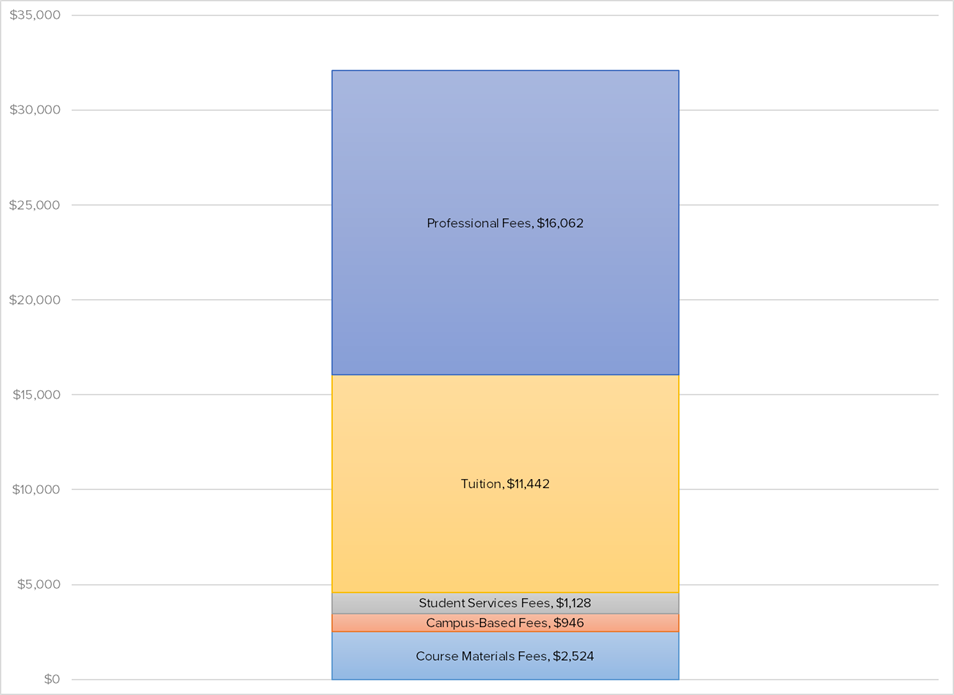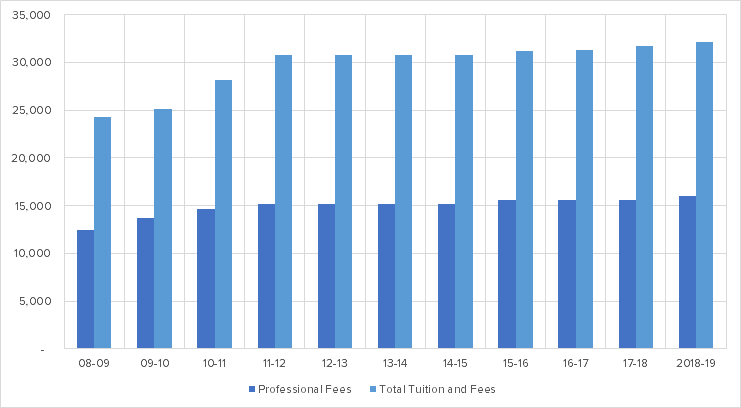- What are the various fees and tuition that I pay every semester and how are they set?
- There are five main components to a DVM student’s tuition and fees that students pay each semester: tuition, professional fees, a student services fee, campus-based fees, and a course materials and services fee. Tuition is set by the University of California’s governing body, the Regents. Professional fees are requested by the school and approved by the Regents, a student services fee is also set by the Regents, campus-based fees are proposed by the campus and approved by the UC Davis student body, and a course materials and services fee is requested by the school and approved by the campus. The campus budget office website describes each component in detail and provides current and historical fees.
Students who are not residents of California pay a nonresident fee (an additional $12,245) until they establish residency. International students would likely pay the nonresident fee for all four years of the program. The UC Student Health Insurance Plan (UC SHIP) fee is paid by students who do not demonstrate another form of health insurance. The chart below shows the total annual fees paid ($32,102) by a resident DVM student in years 1-3 for 2018-19. Fourth year students pay an additional $4,082 because they start their clinical rotations in the summer after the third year.

- What is the history of tuition and fee increases and the school’s strategy for managing these increases?
- The chart below illustrates the tuition and fee history for the DVM program. During the great recession starting in 2008, the University of California’s budget was permanently reduced by the State by over $500 million (nearly a 20% reduction in state funds to the UC system). Unfortunately student tuition and fees were increased during that same period. Since 2011-12 fee increases have leveled off. From 2013-14 to 2016-17, the Governor and the California State Legislature agreed to increase the state budget for UC if the UC Regents agreed to freeze tuition. 2017-18 was the first academic year in six years that student tuition was allowed to increase and then only at the rate of inflation to cover fixed cost increases. Student tuition will remain at the 2017-18 levels for 2018-19.
The School of Veterinary Medicine has kept DVM student professional fees relatively stable over the past several years as can be seen in the chart below. For 2018-19, the school increased professional fees by 3% to cover fixed cost increases in faculty and staff salaries and benefits and increases in the cost of instructional equipment and supplies. Three percent was chosen because that was the regional year-over-year Consumer Price Index increase from 2015-16 to 2016-17.

Historical DVM Total Tuition and Fees and Professional Fees - How are professional fee increases calculated? And, what is the school doing to help students with their debt?
- Professional fees, not tuition, for the DVM program will increase by 3% (+$482) over last year (2019-20). The last increase of this type was over three years ago. However, there is also an increase in the DVM return to aid grant by $600, which means that even with a fee increase that the school is actually more affordable for students. This grant increase more than compensates for the professional fee increase noted above and annual return to aid has increased from $7100 to $7700 for all DVM students paying tuition. Please let our office know if you have any questions.
The school is sensitive to student debt and continues to work hard to fundraise for student scholarships, a top priority for the school, and our scholarship endowment has now grown to $76 million. This endowment earns about $2.7 million each year which, along with the return-to-aid from Professional Fees ($2 million) and return-to-aid from student tuition (also $2 million) is allocated to students annually to offset the cost of tuition and fees. In sum, $6.7 million in aid and scholarships is provided annually to students. For the Class of 2019, the median student debt came in at $96,958 compared to $120,250 from the previous year’s graduates and a mean of $91,486 compared to $101,328*. Across all U.S. veterinary schools, the mean was $132,901. While our school’s mean debt load is below the national average, we are committed to continuously fundraising for scholarships. - What can I expect my salary to be after graduation? What about later in my career?
- While salaries vary across area of emphasis (e.g., small animal, equine), the median starting salaries provide some indication of what you can expect. The median starting salary for a 2017 graduate from UC Davis who did not pursue further advanced education was $90,000. If we include those who did pursue advanced education (residency or internship) in the calculation, the median starting salary was $45,700. These are data from an annual survey of UC Davis DVM graduates by the American Veterinary Medical Association (AVMA).
An associate level veterinarian (as opposed to a practice owner) has a median salary of $100,000. For practice owners, the median salary was $120,000. These data are from the Economic Issues Survey Report by the California Veterinary Medical Association (CVMA) – July – August 2016. - How does the school use my professional fees?
- The table below illustrates how the school plans to use professional fees paid by the DVM students for the DVM program for 2017-18.
Instructional Support Staff Salary and Benefits $2,766,860 32% Student Return-to-Aid $2,090,600 24% Student Services / Academic Programs Operating Budget $1,652,428 19% Faculty Support and Start-up $850,000 10% Instructional Equipment $582,000 7% Teaching Facility Renewal $372,000 4% VMTH Clinical Teaching Support $294,000 3% Total $8,607,888 100% - How do UC Davis’ tuition and fees compare to other veterinary colleges’ and schools’ tuition and fees?
- The table below illustrates the 2018-19 DVM resident tuition and fees for our peer veterinary schools.
UC Davis tuition and fees are below the average of the peer schools listed above.
School or College 2018-19 NC State University $19,439 Texas A&M University $24,160 University of Florida $28,790 Ohio State University $32,350 Cornell University $35,966 Colorado State University $36,220 U. Pennsylvania $59,828 Average $33,607 UC Davis $32,102 - Who can I talk to if I have further questions?
- Please call or email Mary McNally Executive Assistant Dean, Administration – School of Veterinary Medicine at 530-752-0639 or mmmcnally@ucdavis.edu if you have any questions.
